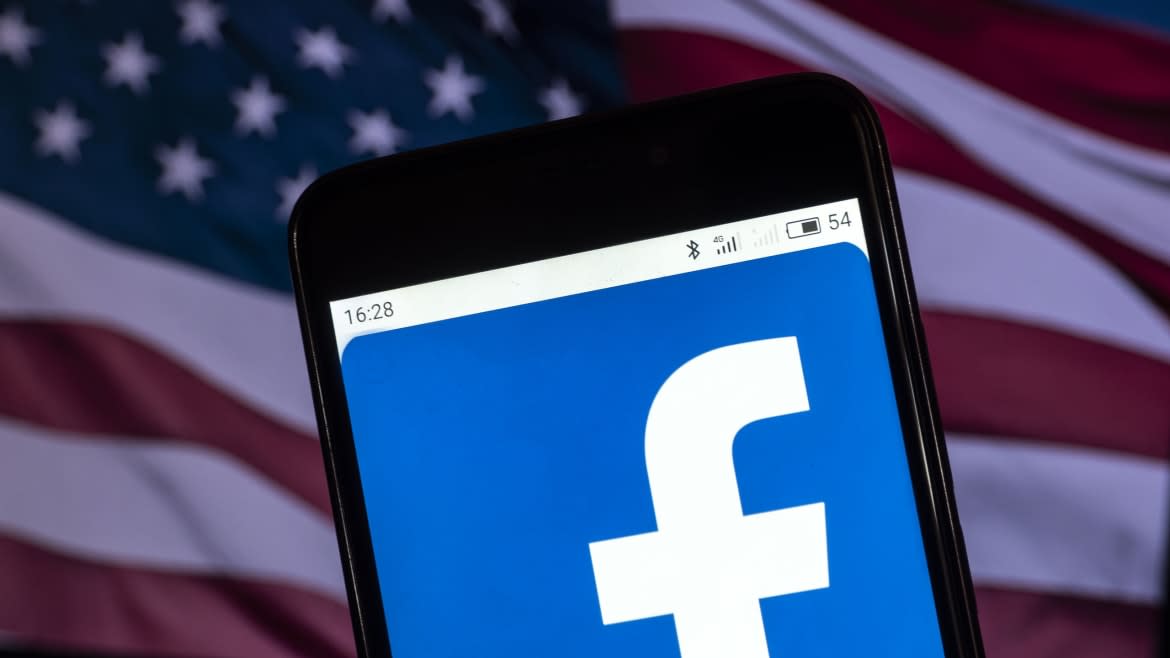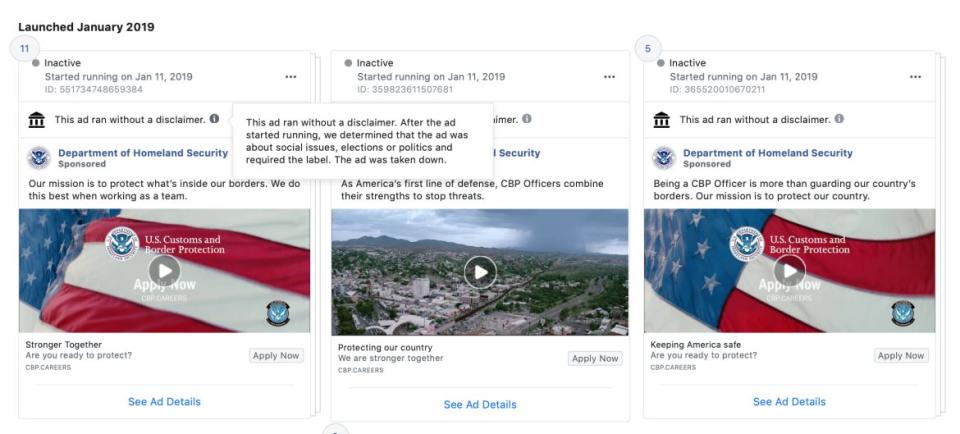Facebook, Instagram Branded Department of Homeland Security Recruitment Ads ‘Political’

The Department of Homeland Security (DHS) runs recruitment ads on Facebook and Instagram, but never for very long. From July 2018 through August 2019, the social networks removed all of them. The reason? The promotions ran without a disclaimer meant for political ads.
By declining to add the disclaimer to its ads, DHS effectively said that the agency’s recruitment isn’t a political issue. By removing the ads for running without the tag, Facebook and Instagram seemed to assert it was.
But in response to a Daily Beast inquiry about the take-downs, a Facebook spokesperson said the ads were removed by mistake and did not need a disclaimer—raising new questions about the accuracy of its filtering efforts.
Facebook requires that all advertisements concerning “social issues, elections, or politics” disclose their buyers, who are verified by the company. This notice appears in a small addition to the ads: a line of text reading “paid for by” that a user can click on it to learn more about the funding source. For example, President Donald Trump’s ads display “Paid for by Trump Make America Great Again Committee,” whereas Walmart’s just say “Sponsored.” Facebook’s Ad Library archives ads concerning politics, housing, employment and credit for seven years, other types for only one—a policy that came into effect in May 2018.
Facebook and Instagram removed 26 DHS ads from circulation between July 2018 and August 2019. DHS is currently running 57 ads, none of which carry disclaimers. The agency did not respond to multiple requests for comment.

Grace Briscoe, who oversees political ad buying at the online ad software company and agency Centro, said her clients often run into the problem of Facebook’s broad and unclear interpretation of what is “political.”
“There are government and regulatory definitions, and then Facebook went and drew their own definition totally differently,” Briscoe said. “Drawing the line as broadly as possible is well-intentioned, but it is, in reality, a disaster.” She said she’s spoken with Facebook staff multiple times about the issue.
The law defines a political ad as a partisan one related directly to an election, a candidate, or ballot measure. A 1976 Supreme Court established eight words that make an advertisement political under campaign finance law: “vote for,” “elect,” “support,” “cast your ballot for,” “[Candidate] for [office],” “vote against,” “defeat,” and “reject.”
Facebook’s policy encompasses much more. Ads concerning elections and legislation require disclaimers, but so do ads about social issues, which, according to Facebook’s advertising policies, include anything referencing “civil and social rights, crime, the economy, education, environmental politics, guns, health, immigration, political values and governance, and security and foreign policy.”
If an advertiser is running political ads, Facebook requires that the buyer submit to a verification process and append a disclosure to their ad when purchasing it. The buyer also won’t have access to the demographic targeting tools a regular buyer would. If a user flags an ad running without a disclaimer as political, Facebook will review it—both algorithmically and via human moderators—and determine whether the ad does refer to social issues or elections. If it does, Facebook removes it and archives it in the Ad Library.
The advertiser can’t add the political tag after the ad has already started appearing to users; they must repost the ad or appeal the suspension to Facebook. Briscoe described the appeal process, which often takes days, as “neither simple nor flexible.” Facebook doesn’t notify advertisers why their ads were deemed political, nor does it explain any ad removals to buyers.
Twitter Will Ban Politicians From Buying All Ads, In Stark Contrast With Facebook
The work of law enforcement is, in theory, supposed to disregard politics, but by virtue of DHS’ oversight of anti-terrorism efforts and immigration enforcement, especially the work of Customs and Border Protection and Immigration and Customs Enforcement, the agency has become one of the most controversial of the 15 agencies that make up the presidential Cabinet.
Of the other Cabinet departments, only Veterans Affairs has encountered the same problem as DHS on Facebook. Even then, the magnitude is not the same: just two Veterans Affairs’ ads were taken down for running without disclaimers. Both ran in June 2019 and promoted smoking cessation services for veterans. Two 2018 ads from the Center for Disease Control promoting vaccination against HPV, a topic many would have considered apolitical, were removed for running without political ad disclaimers.
Ads run by the Air Force’s official recruitment page appear to be a close analogue to DHS. The page has run recruitment ads with and without disclaimers throughout 2019, some of them identical. There does not appear to be a readily available explanation as to why one version of an ad, indistinguishable from another, requires the disclaimer.
Briscoe said that among her company’s clients, utility providers suffer most often from Facebook’s broad definition of politics. The companies often buy ads mentioning renewable energy and sustainability, loosely associated with environmental activism, that require the political ads tag—such as several November 2019 ads for the Southern California Gas Company’s plans to use renewable natural gas. Sometimes they seem wholly unrelated; a 2018 Pacific Gas & Electric ad for an earthquake drill bore the disclosure. The difficulty doesn’t directly cost advertisers money because they don’t pay up front for Facebook ads, though taken-down Facebook ads may result in wasted employee time, she added.
“Facebook has drawn this definition so broadly that a lot of things get caught up. If you’re talking about border security and immigration, that’s an issue of national importance, and that means DHS ads get flagged as ‘political’ even though all they’re trying to do is recruit. I don’t think you’d reasonably define that as a political ad,” she said.
For nonprofits and government agencies prohibited from partisan activity, Briscoe said, the designation is an anathema. A nonprofit’s tax status is dependent on refraining from electioneering, though Briscoe added the IRS likely wouldn’t take Facebook’s ad designation into account.
Political ads have landed Facebook in hot water in recent months due to CEO Mark Zuckerberg’s decision not to fact-check politicians running ads. Lawmakers blasted the CEO in a public hearing over the choice, and Facebook’s own employees lamented the policy. This year has seen the country’s largest tech companies tangle with politics more than before, often with adverse consequences to their reputations as sunny and conflict-free workplaces, such as when Google banned the discussion of politics at its offices.
Got a tip? Send it to The Daily Beast here
Get our top stories in your inbox every day. Sign up now!
Daily Beast Membership: Beast Inside goes deeper on the stories that matter to you. Learn more.

 Yahoo News
Yahoo News 
